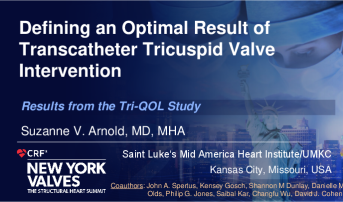Changes in Quality of Life Mirror TR Reductions After Tricuspid Procedures: Tri-QOL
The results suggest minimal health status benefits once TR has dropped by three grades, but further research is needed.

NEW YORK, NY—Patients undergoing transcatheter tricuspid valve interventions (TTVI) see health status improvements largely mirroring the degree of tricuspid regurgitation (TR) reduction, according to an analysis of the investigator-initiated Tri-QOL study.
The association between these outcomes was somewhat related to the patients’ baseline TR level, and researchers found a plateau in health status improvement once TR had been reduced by three grades.
“We believe that these findings support a therapeutic goal of achieving mild or less TR with TTVI, although patients who start out with torrential TR may be well served if moderate TR can be achieved,” said Suzanne V. Arnold, MD (Saint Luke’s Mid America Heart Institute, Kansas City, MO), who reported the findings last week at New York Valves 2025. “These findings may be useful to inform both device selection and procedural optimization with TTVI.”
Both transcatheter edge-to-edge repair (TEER) and transcatheter tricuspid valve replacement (TTVR) have emerged as treatment options for patients with severe TR, especially for improving patient quality of life.
Some have argued that the Kansas City Cardiomyopathy Questionnaire (KCCQ) might not be the best metric for gauging quality of life, particularly since it was developed for patients with heart failure, but both the TRILUMINATE Pivotal trial of TriClip (Abbott) and the TRISCEND II trial of TTVR with Evoque (Edwards Lifesciences) have reported large improvements in these patient-reported outcomes following treatment.
Tri-QOL Findings
This new study combines patient-level data from 11 single-arm and randomized studies conducted by Edwards Lifesciences and Abbott into a pooled and blinded analysis of 1,056 patients (mean age 79.1 years; 60.3% female) undergoing TTVI; 41.1% were enrolled in the US. Mean baseline KCCQ overall summary score was 49.5, with about a third of patients each categorized as having severe, massive, or torrential TR.
By 1 month, the mean change in TR grade was 2.4, with roughly 25% of patients each classified as none/trace, mild, moderate, or severe or greater TR.
Unadjusted analyses showed a “stepwise relationship” between lower TR grade both at baseline and 1 month and improvement in KCCQ, Arnold reported.
Researchers also saw a “fairly linear association” between the TR grade at 1 month and improvement in KCCQ, “so less TR is better in terms of health status improvement,” she said. A similar relationship was also seen with KCCQ when analyzed as a function of change in TR, with a “slight leveling off of that curve around a three-grade reduction.”
A final model showing the impact of TR level at 1 month on the change in KCCQ showed better outcomes with larger reductions, especially for those with greater baseline TR. But even for those originally with torrential TR, “after you get to moderate, there does not seem to be a lot more KCCQ improvement for greater TR reduction,” Arnold noted.
What’s the Placebo Effect?
Because tricuspid interventions have translated into a larger effect on KCCQ than medications in these patients, discussant JoAnn Lindenfeld, MD (Vanderbilt University Medical Center, Nashville, TN), questioned whether some of the quality-of-life improvement with devices might be psychological. For example, patients who had no change in or a worsening of TR at 1 month still had a 10.6-point improvement in KCCQ.
“Can we assume that’s the placebo effect?” she asked.
Arnold said this could in part be due to some placebo effect, but “there are a lot of things that happen between baseline and 1 month, whether that’s change in medications or a Hawthorne effect or regression from the mean. I think there are a number of factors.” Additionally, TR grade falls on a spectrum even within what is deemed torrential or massive, she added. “So, there could be some degree of improvement even though they’re both classified as massive.”
Lindenfeld also wondered if the extent of placebo effect is similar or greater in patients who start with worse TR. She also questioned how much the KCCQ can be used as a “surrogate” for morbidity and mortality over and above a measurement of quality of life and said researchers might be able to use Tri-QOL data in the future to tease out if lowering TR will affect hard outcomes.
Several studies have already shown “that improvement in KCCQ at 1 month is associated with a reduction in the risk of heart failure hospitalization and mortality in the TR population,” said Arnold. “So while the event rates in these TTVI studies are relatively low, and I think they’re highly underpowered, that association is absolutely there.”
Panelist and surgeon Paolo Denti, MD (Istituto di Ricovero e Cura a Carattere Scientifico Ospedale San Raffaele, Milan, Italy), said he finds it “quite strange to suggest that an operator leave moderate TR in a patient, because as a surgeon we have one shot, so we tend to get rid of TR completely.” Despite not being able to completely connect KCCQ to mortality, he continued, “in the patient that you have complete reduction of TR, . . . maybe you have a better survival, and you can say that from your data.”
Arnold agreed. Studies looking at residual TR following tricuspid procedures haven’t given clear information on the effect on clinical outcomes yet, she said. “That being said, I absolutely agree that getting to mild or less is probably better.”
Yael L. Maxwell is Senior Medical Journalist for TCTMD and Section Editor of TCTMD's Fellows Forum. She served as the inaugural…
Read Full BioSources
Arnold SV. Defining an optimal result of transcatheter tricuspid valve intervention. Presented at: New York Valves 2025. June 26, 2025. New York, NY.
Disclosures
- This research was funded by an investigator-initiated contract from the US Food and Drug Administration.
- Arnold reports no relevant conflicts of interest.
- Lindenfeld reports grant support/research contracts from AstraZeneca, Sensible Medical, and Volumetrix and consultant fees/honoraria/speaking fees from Abbott, Alleviant Medical, AstraZeneca, Boehringer Ingelheim, Boston Scientific, CVRx, Edwards Lifesciences, Impulse Dynamics, and V-Wave.
- Denti reports consultant fees/honoraria/speaking fees from Abbott Vascular, Edwards Lifesciences, Innovheart, HVR, Approxima, Artiness, Pi-Cardia, and Simulands.






Comments